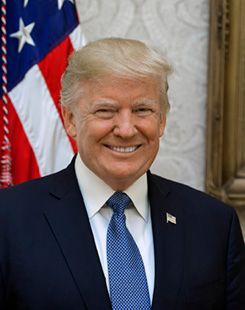 The market has been on a tear since Trump moved into the oval office. But is he good or bad for the market?
The market has been on a tear since Trump moved into the oval office. But is he good or bad for the market?
His style is combative and divisive. This brings on volatility. The opposite of what investors want. Investors prefer predictability.
However, his trade and economic moves are good for the economy. It should continue to drive the stock market higher.
(What I’m about to say is somewhat political, so please keep that in mind).
I believe that the role of domestic and foreign politics are playing a huge impact on the Trump agenda, so I’d like to start there.
First some historical context.
For nearly 20 years, US foreign policy has been dominated by military campaigns in Iraq and Afghanistan.
In order to effectively prosecute two major wars, the US required real foreign support. The US needed on-the-ground support to move military material. (For example, we needed bases in Turkey. Bargains and compromises were made.)
Also, fighting on 2 fronts weakened the US ability to project military power because everyone knew that a 3rd front couldn’t be opened.
The wars demanded a lot of money, time and focus.
Our allies and adversaries took advantage of the US’s distraction and military weakness:
- Turkey attacked the Kurds because they knew the US would value the air bases in Turkey over supporting the Kurds.
- Russia annexed Crimea because they knew we wouldn’t intervene militarily.
- China built island naval bases in order to expand their military presence
And so on.
But each of these countries also understood the window of opportunity was closing: at some point the US would leave the morass and be less distracted.
Seeing the end game, Russia seized Crimea because they correctly calculated that Obama would not put US troops into yet another battlefield. This would not be the case a few years hence. They were correct: Obama enacted sanctions but took no military action.
But the US is more inclined to revert to their position as global leader – economically and militarily -with Iraq/Afghan war requirements winding down.
The controversy now is Trump shaking up the talks with our biggest allies (ie Canada, the E.U., Mexico). The US needs other countries less, and other countries need the US more.
So the quid pro quos change.
Instead of sacrificing foreign policy and trade in return for military support, the US offers military support and trade access and expects foreign policy and trade support.
When Saudi Arabia recently petitioned the US for military support, Trump told them to pay for it.
When the UN voted against US agendas, Trump told them that the US would review the support and money it gives to countries that consistently work against the US.
The message is clear: whoever pays the piper calls the tune.
In some way, shape, or form, the US was going to return to a more US-centric approach to the world.
It’s what happened after the US left Vietnam. Trump has simply accelerated the process and his style is hardly diplomatic. Indeed, other countries have not adjusted to the new reality of an assertive US, much less the Trump combativeness.
Except…they are responding in exactly the way they must. China will buy more US goods. The E.U. and Canada will change their tariffs and buy more US goods. Because Trump is very correct: the US is the senior partner and forces change whether the world likes it or not.
As an investor, this is powerful stuff. Trump will most definitely push for – and get – at least $100 billion in incremental annual exports from China and Europe. The economic impact is huge.
And the market is waking up to the way Trump’s various moves are adding up to solid economic benefits
So to answer the question: Is Trump good or bad for this market?
My answer is yes – the bull market has legs.






